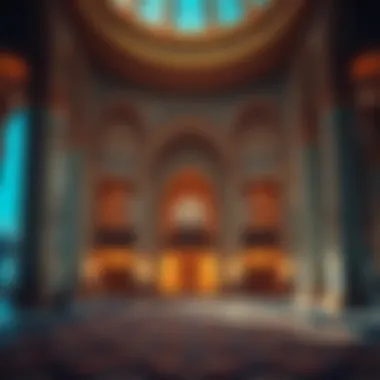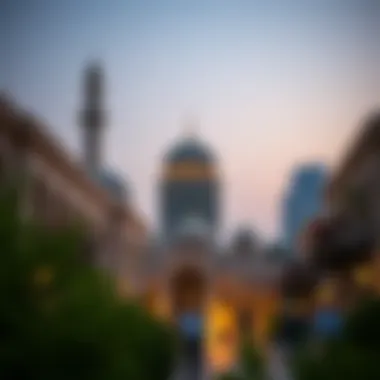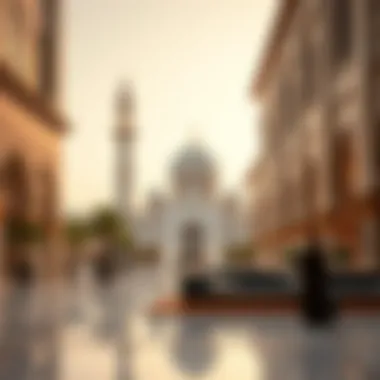Understanding Ramadan 2023 in Dubai: Timing and Significance


Intro
Ramadan is not just a month of fasting for Muslims; it is a period of deep spiritual reflection, community bonding, and cultural expression. In 2023, Dubai brings its own unique flavor to the traditional practices associated with the holy month. From the bustling Iftar gatherings in various neighborhoods to the serene Taraweeh prayers in over 1,000 mosques across the city, Dubai is a melting pot of experiences during this sacred time.
Understanding the significant cultural and economic aspects of Ramadan in the context of Dubai helps to appreciate how deeply embedded these traditions are within the fabric of society. As the sun sets, the city’s landscape transforms into a dazzling display of lights and activities, enhancing the sense of community as residents come together to break their fasts, share meals, and participate in community events.
In this article, we will navigate through various elements of Ramadan—timings, practices, and the overall significance—to provide a comprehensive guide that resonates with expatriates, investors, realtors, homeowners, and entrepreneurs interested in grasping the essence of this holy month in Dubai.
Ramadan Overview
Ramadan is not just a month on the Islamic calendar; it represents a profound period for millions of Muslims worldwide, particularly for those residing in vibrant cities like Dubai. Understanding this holy month allows for a deeper appreciation of its spiritual significance and cultural richness. This overview will explore the fundamentals of Ramadan, highlighting its essence, its immense importance in Islamic faith, and how it varies across different cultures.
What is Ramadan
Ramadan is the ninth month of the Islamic lunar calendar, observed by Muslims as a month of fasting, prayer, reflection, and community. During Ramadan, the faithful abstain from food and drink from dawn until sunset, engaging instead in spiritual practices, including increased prayer and reading of the Quran. The fast is known as Sawm, one of the Five Pillars of Islam, which dictates not only physical abstinence but also promotes ethical and spiritual refinement. Ramadan can last from 29 to 30 days, depending on the lunar sighting, culminating in the celebration of Eid al-Fitr.
Significance in Islam
The significance of Ramadan within Islam goes beyond the simple act of fasting. It serves as a time for self-discipline, self-reflection, and empathy towards the less fortunate. Muslims believe that fasting helps purify the soul and fosters a sense of solidarity among the community. In the Quran, it is stated that the fast is designed to promote taqwa, or consciousness of God. This month also witnesses the revelation of the Quran, marking it as a time of heightened spirituality and devotion.
Differences Across Regions
While the core tenets of Ramadan are universally observed, the way it is celebrated can diverge considerably based on regional customs and traditions. For example:
- Middle Eastern countries, like the United Arab Emirates, typically see vibrant night markets and community iftars, where people gather to break their fast together.
- In Southeast Asia, countries like Indonesia and Malaysia often incorporate local delicacies into their iftar meals, celebrating culinary diversity.
- In North Africa, it’s common for families to gather around highly ornate tables filled with traditional dishes, creating a festive atmosphere.
Each of these practices reflects local cultural nuances, which enrich the observance of Ramadan on global scale.
Understanding these diverse practices is crucial for anyone engaging with Muslim communities, especially in cosmopolitan places like Dubai, where multiple cultures converge. Future sections will delve into the specific dates and timings for Ramadan 2023 in Dubai, the unique fasting practices observed, and the cultural events that define this month.
Ramadan Dates in Dubai
Understanding the dates of Ramadan is essential for both the local Muslim community and visitors in Dubai. This holy month, marked by fasting and spiritual reflection, changes every year, dictated by the lunar Islamic calendar. Knowing the start and end dates is not just about a schedule; it helps deepen the appreciation of this important period, enabling individuals to prepare spiritually and logistically. Focusing on the significance of the dates helps both residents and expatriates connect with the traditions and customs practiced during Ramadan.
Start and End Dates
Ramadan in 2023 is expected to begin around the evening of March 22 and will likely conclude on the evening of April 20. However, the exact timings depend on the sighting of the moon, which can vary in different regions. The anticipation surrounding these dates is palpable, as families and communities prepare for a month filled with fasting, prayer, and togetherness.
The beginning of Ramadan signifies a time for spiritual renewal and self-discipline.
Knowing the start and end dates enables people to plan their daily routines, adjust their work schedules, and prepare for the communal aspects of the month. Observing the fast from dawn until sunset requires careful consideration of meal preparations and family gatherings, which hinge on these vital dates.
The Crescent Moon Sighting
The sighting of the crescent moon marks the official start of Ramadan. This tradition is derived from the saying of the Prophet Muhammad, which emphasizes the importance of community and shared experience in religious observance. In Dubai, local authorities often set up committees that scout for the new moon, with announcements made through various media once it’s sighted.
This aspect of Ramadan connects all Muslims, creating a sense of unity and anticipation. When the crescent moon appears, hearts lighten with joy, and homes prepare for the dawn of Ramadan. It's common for communities to gather for the announcement, bringing a sense of excitement and togetherness.
Eid al-Fitr Timing


Eid al-Fitr concludes Ramadan, celebrating the end of fasting with joyous festivities. In 2023, Eid planning usually starts once Ramadan’s last day is confirmed; it is expected to fall on April 21 or 22, depending on the moon sighting. This day is marked by communal prayers, feasting, and acts of charity, embodying the spirit of gratitude and giving that defines the conclusion of Ramadan.
For expatriates and tourists in Dubai, being aware of these dates is crucial, not only for participating in local traditions but also for avoiding scheduling conflicts regarding travel or work commitments.
Understanding the cycle of Ramadan—from its initial moon sighting to the celebratory atmosphere of Eid al-Fitr—enriches the experience for both locals and visitors, deepening their connection with this significant time in Dubai.
In summary, the Ramadan dates set the precedent for a month filled with profound spiritual reflection and yield a distinct cultural atmosphere that makes Dubai truly unique during this period.
Fasting Practices
Fasting during Ramadan is a cornerstone of the month, embodying both physical and spiritual discipline. Not just about abstaining from food and drink, it holds a deeper significance. This practice cultivates empathy for the less fortunate, enhances self-control, and encourages spiritual growth. Observers of Ramadan reflect on their personal beliefs while embracing a communal spirit that binds families and communities together. It's a time when every moment spent in devotion or reflection is a step toward self-improvement and connection with others.
Daily Schedule
Suhoor Timing
Suhoor, the pre-dawn meal, plays a pivotal role in sustaining energy and focus throughout the fasting day. Typically consumed in the early hours before Fajr prayer, it serves as an essential nourishment point. A key characteristic of Suhoor is its timing; it must be consumed before the first light of dawn. This meal often includes hydrating foods and complex carbohydrates to prevent exhaustion.
What sets Suhoor apart is its ability to encourage individuals to wake early, creating a quiet moment of reflection before the day begins. Including fruits, oats, or whole grains can be especially beneficial because they digest slowly. However, overindulgence in heavy or spicy foods might lead to discomfort, reinforcing the need to remove certain tastes from the menu.
Iftar Timing
Iftar, which breaks the fast at sunset, is much anticipated as the day draws to a close. This meal starts with the traditional date and water, quickly providing energy after hours of fasting. Iftar timing is absolutely crucial; it occurs precisely at Maghrib, marking the end of the day's fast. The act of gathering around the table is often central to family life during Ramadan, promoting a sense of belonging.
A unique feature of Iftar is its community aspect, with numerous events held where families and friends come together to break their fast. However, in the swiftness to indulge, some may forget moderation, resulting in potential digestive discomfort. Circling back to the spirit of Ramadan, Iftar moments should aim for balance and gratitude as families celebrate not only sustenance but the friendships forged over shared meals.
Religious Observances
Prayers and Quran Recitation
During Ramadan, the observance of prayers and Quran recitation takes on increased significance. Muslims are encouraged to perform additional prayers, such as Taraweeh, which are held after the Isha prayer. This practice allows for a deeper engagement with faith, as longer recitations and reflections are common. The characteristic aspect of Quran recitation is the focus on understanding rather than mere memorization. Readers feel a profound connection to the verses, exploring the teachings while seeking guidance for their own lives.
Highlighting prominent aspects, attending communal prayers at mosques enables a sense of unity among worshippers. However, the physical toll of late-night prayers may be a consideration for some, especially those balancing work and family responsibilities.
Charitable Acts
Charitable acts, or Zakat, especially during Ramadan, represent a pillar of the Islamic faith. Ramadan is often viewed as the ideal time for engaging in philanthropic activities, as many Muslims aim to give generously. This practice can include monetary donations or food distribution to those in need. The significance lies in the increased focus on empathy and community support, roots of what it means to partake in Ramadan.
Unique features of charitable giving during this sacred month include organized community drives and programs aiming to feed the less fortunate. However, navigating the multitude of organizations can pose challenges, so it's critical to research trustworthy initiatives. The emotional and spiritual benefits associated with giving not only enhance the lives of recipients but also promote a sense of peace and fulfillment in the giver's heart.
Cultural Events During Ramadan
Ramadan is a rich tapestry of cultural events, serving as a cornerstone for community bonding and spiritual rejuvenation. In Dubai, these events not only reflect the historical context of the holy month but also allow for the evolution of traditions that embrace modernity while holding steadfast to long-standing customs. The cultural vibrancy of Ramadan in Dubai creates a unique atmosphere, encouraging interaction among various communities, which is a significant aspect given the city's diverse population.
Community Gatherings
Community gatherings during Ramadan in Dubai serve as platforms for social connection and engagement. They bolster a sense of belonging among people, whether families, expatriates, or natives. These gatherings provide essential support and exhibit the spirit of unity that Ramadan stands for.
Majlis Experiences


Majlis, traditionally a place for discussion and decision-making, transforms during Ramadan into communal spaces for sharing iftar meals and exchanging stories. The key characteristic of these experiences is their open-door policy, inviting both friends and strangers to partake in food and conversation. This inclusiveness makes it a valuable choice for those wanting to immerse themselves in local customs.
A standout feature of Majlis experiences is the traditional Arabic coffee and sweets that are often served alongside the meals. These refreshments not only aid in breaking the fast but also symbolize hospitality. The advantages of participating in a Majlis are manifold; individuals can indulge in authentic cuisine, engage in rich cultural discussions, and foster new friendships. However, one should be mindful of the etiquette expected in these gatherings, as respect and politeness are paramount.
Community Iftars
Community Iftars represent another vital aspect of Ramadan in Dubai. They are often organized across neighborhoods, featuring shared meals that allow people from all walks of life to come together. The main attribute of Community Iftars is their communal spirit, drawing individuals and families to break their fast as a collective rather than in solitude. This shared experience enriches the Ramadan atmosphere and exemplifies the essence of unity.
A unique element of Community Iftars is the collaboration between local restaurants, mosques, and community organizations to provide free meals to those in need. This generosity stands out particularly during this holy month. Among the advantages are the opportunities for cultural exchange and the enhancement of social networks, but there can be challenges as well. Some may find it difficult to navigate large crowds or feel out of place if they are not familiar with local customs. Nevertheless, Community Iftars remain a cherished highlight of Ramadan celebration.
Art and Entertainment
Art and entertainment during Ramadan add another layer to the cultural landscape in Dubai. They offer moments of joy and creativity that balance the solemnity of fasting. Various forms of artistic expression seek to engage the community while respecting the sacred nature of the month.
Cultural Festivals
Cultural festivals in Dubai during Ramadan are a feast for the senses, showcasing art, music, and performance specific to the month. These events highlight local talent and often incorporate traditional and contemporary themes. They are attended by individuals who want to augment their Ramadan experience with cultural enrichment.
The significant aspect of these festivals is their focus on family-friendly fun, which embraces children and elders alike. Each festival often features unique activities like crafts and workshops that teach about Ramadan’s history and significance. The advantages of attending these events include leisurely enjoyment of culture and art in an engaging atmosphere, but they may draw larger audiences, which could dilute the personal connection some seek during Ramadan.
Ramadan Marketplaces
Ramadan marketplaces in Dubai bring an array of products, food, and handmade crafts to the forefront. These bustling spaces serve as an intersection of commerce and culture, providing a lively environment for exploration while being distinctly festive. Their popularity comes from the variety they offer, catering to all tastes, from traditional snacks to contemporary goods.
A standout feature of these marketplaces is their nightly vibrancy, as they often span several hours post-iftar, integrating socializing with shopping. One major advantage of visiting Ramadan marketplaces is the chance to discover unique items specific to the month and engage with local artisans. However, the crowds can sometimes make shopping less enjoyable, particularly for those seeking a more tranquil experience.
In summary, the cultural events during Ramadan in Dubai illuminate the many ways in which the community embraces the values of this holy month. They provide a rich playground for connection, understanding, and enjoyment, which is essential not only for Ramadan but also for the broader spirit of the city.
Economic Impact of Ramadan in Dubai
Ramadan in Dubai is not solely a time of spiritual reflection; it significantly influences the local economy, intertwining cultural practices with commercial activities. Understanding this impact is crucial for investors, expatriates, and entrepreneurs who aim to navigate the dynamic landscape of the region during this holy month. Various elements come into play— from retail sales to the hospitality sector, showing how Ramadan affects financial trends and community engagement alike.
Retail and Dining Trends
The retail industry experiences a notable uptick during Ramadan. With longer shopping hours and special promotions tailored for families preparing for iftar meals, businesses see increased foot traffic and sales. Store sales can spike anywhere from 15% to 50% as people indulge in festive shopping. Local markets and malls create a unique ambiance, featuring diverse activities that attract consumers not just to buy, but to celebrate together.
Food establishments also adapt their offerings. Many restaurants launch special iftar menus, enticing patrons with traditional dishes at affordable prices. This is beneficial not only for the owners but also for families looking to break their fast with a sumptuous meal outside their homes.
Additionally, local businesses often engage in charitable activities. They may choose to provide meals for the less fortunate, creating a sense of community while enhancing their brand image.
Tourism During Ramadan
Visitor Experiences
Visitors often find that experiencing Ramadan in Dubai offers a unique cultural journey. The atmosphere during this time is electric; streets are adorned with lights and decor, contributing to a festive spirit that highlights Arabian traditions. Many tourists come to partake in Ramadan-related activities, from enjoying community iftars to visiting local mosques and participating in prayers. This cultural immersion not only enriches their travel experience but also fosters appreciation for the local customs.
One key characteristic of visitor experiences is the opportunity for guided tours through historical sites, showcasing how Ramadan blends with the ancient traditions of the region. Tour operators often host special Ramadan tours, giving visitors the chance to learn about the significance behind various customs. Those seeking an in-depth understanding are met with knowledgeable guides who narrate intriguing stories of the past, making this a beneficial choice for those curious about cultural heritage.
Hospitality Sector Adjustments


The hospitality sector undergoes several adjustments during Ramadan, focusing on enhancing the guest experience while being sensitive to the practices of fasting. Hotels commonly modify their meal offerings and timing, serving breakfast earlier for suhoor and hosting lavish iftar buffets. This adjustment ensures that international tourists can enjoy the local flavors while catering to Muslim guests observing the fast.
A unique feature of these adjustments is the way hotels foster a welcoming environment for all visitors. This not only adds value to their services but also enhances customer loyalty. Travelers appreciate the understanding displayed by hotel staff and often leave with positive reviews, which can serve as a solid recommendation for future patrons.
"Ramadan reshapes the landscape of commerce and social interaction in Dubai, leaving an indelible mark on both residents and visitors alike."
Tips for Visitors During Ramadan
Ramadan in Dubai is a period ripe with culture, spirituality, and community bonding. For visitors, understanding the intricacies of this holy month opens a door to rich experiences and connecting with the local populace. It’s not merely about abstaining from food and drink during daylight hours; it goes deeper into the realm of customs, traditions, and a unique societal rhythm. Knowing how to navigate these waters can enhance your stay and show respect to those observing the fast.
Understanding Local Customs
When traveling to Dubai during Ramadan, grasping the local customs is foundational. Local culture is steeped in respect and tranquility. Many Emiratis engage in charitable acts during this time, with a significant emphasis on kindness, prayer, and reflection. For instance, offering greetings of ‘Ramadan Mubarak’ is a common gesture that resonates goodwill, showing appreciation for the significance of the month.
"To understand a people, you must first understand their traditions."
This mindset helps to foster interactions that can lead to richer experiences. Visitors are encouraged to immerse themselves in community activities, as many mosques open their doors for non-Muslims to learn about Islamic practices, which could provide meaningful insights into the essence of Ramadan.
Dining Etiquette
In Dubai, the dining scene transforms during Ramadan. While visitors might initially find it challenging to dine out, knowing the etiquette around meals during this period can greatly enhance your experience.
Timing and Locations
Dining during daylight hours isn’t typically permissible for Muslims, so understanding timing is essential. Most restaurants shift their hours, opening only after sunset. Places like Al Fanar Restaurant or the various cultural cafes set up special Iftar buffets, welcoming both locals and tourists with open arms after a full day of fasting.
The key characteristic of dining locations is their adaptiveness. Restaurants cater specifically to the needs of Ramadan by offering special menus that feature local dishes. This not only adds to the culinary experience but also highlights the communal aspect of sharing meals after fasting, a beautiful tradition worth partaking in.
Perhaps one of the most beneficial choices for knowing the right locations is their availability of multicultural Iftar experiences, where visitors can sample cuisines from around the globe, making it a delightful culinary adventure.
Respectful Behavior
Respecting the customs of Ramadan goes beyond just timing; it encapsulates an understanding of community values. Engaging in conversations at the wrong moments or eating in public can be seen as disrespectful by locals observing the fast. Thus, a level of discretion is paramount.
Visitors should highlight their awareness of fasting practices, perhaps enjoying refreshments discreetly and only in designated areas. This consideration fosters mutual respect and enhances the experience. Another unique feature of respectful conduct is refraining from playing loud music or making gestures that might be perceived as offensive.
By embodying respectful behavior, visitors contribute positively to the overall ambiance of the holy month. It not only reflects well on the individual but also establishes a respectful rapport with the community. The advantages of maintaining good behavior during Ramadan can't be overstated, as it enriches the interaction with locals and allows for meaningful engagements.
In summary, prepping for Ramadan as a visitor in Dubai means more than just altering your dining schedule. It’s about embracing the essence of the season, understanding profound local customs, and striving for respectful interactions. The outcome? A fulfilling experience that deepens your connection to Dubai's rich blend of tradition and modern life.
Ending
The conclusion of our exploration of Ramadan practices in Dubai serves as a crucial reminder of the deep-rooted significance this holy month holds within the community. It encapsulates the essence of Ramadan, marking not just a period of fasting, but a vibrant tapestry of cultural and spiritual experiences that unify individuals from all walks of life.
Reflection on Ramadan's Importance
Ramadan is more than just abstaining from food and drink during daylight hours; it embodies a time for reflection, compassion, and connection. The communal breaking of the fast at iftar, often shared among family and friends, fosters a sense of togetherness that transcends individual differences.
During this month, the values of empathy and charity shine brightly. It’s common for individuals to engage in charitable acts, donating time or resources to those in need. This collective spirit of giving not only supports the less fortunate but strengthens societal bonds. As many expats find themselves far from home, this sense of community becomes an anchor, helping to forge meaningful connections in their new environment.
Furthermore, the spiritual aspect cannot be overlooked. Evening prayers and Quran recitations form the backbone of nightly routines, allowing for individual introspection and communal worship. The act of fasting itself purifies both body and soul, creating a rich path for personal growth.
Looking Ahead: Preparing for Future Ramadans
As we anticipate future Ramadans, preparing becomes essential to fully embracing the experience. Understanding the ebb and flow of community events, local customs, and etiquette during this month will allow visitors and newcomers to immerse themselves in the Ramadan fabric of Dubai.
- Mark Your Calendars: Take note of expected dates for the start and end of Ramadan each year.
- Learn Local Customs: Engage with local traditions, possibly by attending majlis gatherings and community iftars. These experiences will deepen your understanding of the culture.
- Respectful Observations: Being mindful of those fasting is critical. If dining out, opt for eateries that cater to Ramadan schedules, showing respect for the customs in place.
- Volunteering: Consider getting involved in charitable efforts. Many organizations ramp up their outreach during Ramadan, offering opportunities for those wanting to contribute.



